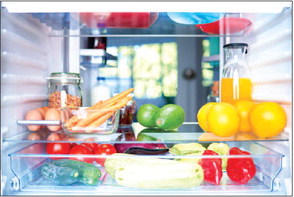When temps rise, don’t overstuff freezers and other helpful tips


REFRIGERATOR SAVVY
A refrigerator that hums along when the weather is fine may start to stress out when temperatures rise. Residents should make sure not to overstuff their freezers when temperatures soar because their appliances will have to work harder to hold temperatures and that can overtax them, causing early breakdowns.
Zero degrees (or even lower) is the best temp for long-term frozen food storage, so set your freezer as low as it will go. And if you find that your ice cream gets too hard to scoop, store it on the door where the temperature will be the highest.
To keep food safe, refrigerators should maintain a temperature between 35 and 38 degrees F, according to energystar.gov. Setting the temperature too high puts your food at risk of spoiling and setting it too low wastes energy. If your refrigerator doesn’t have a built-in thermometer, use an appliance thermometer.
Here are some other tips from the U.S. departments of Energy and Agriculture.
• Set the appropriate temperature.
• Allow air circulation behind the fridge.
• Leave a few inches between the wall and the refrigerator, and keep the condenser coils clean if you have an older model. Read the user’s manual to learn how to safely clean coils. Coil cleaning brushes can be purchased at most hardware stores.
• Check the door seals. Make sure they are airtight. If not, replace them.
• Keep the door closed.
• The front grill should be kept free of dust and lint to permit free air flow to the condenser.
• Keep food covered. Cover liquids and wrap foods before storing them. Uncovered food and beverages release moisture into the unit making the compressor work harder.
• Watch door storage. The temperature of the storage bins in the door fluctuate more than the temperature in the cabinet so don’t store perishable foods in the door. Eggs should be stored in the carton on a shelf, according to Consumer Reports.
• Don’t overload it. Adding too many room-temperature items such as cans of soda or bottles of juice causes your refrigerator to work harder at cooling. Just add enough to cover your needs for a day or two.
• Defrost often. If you have a manual defrost don’t allow the frost to build up more than a quarter of an inch.
Following these simple guidelines can help your refrigerator perform at it’s best and maintain temperatures that keep your food safe.



